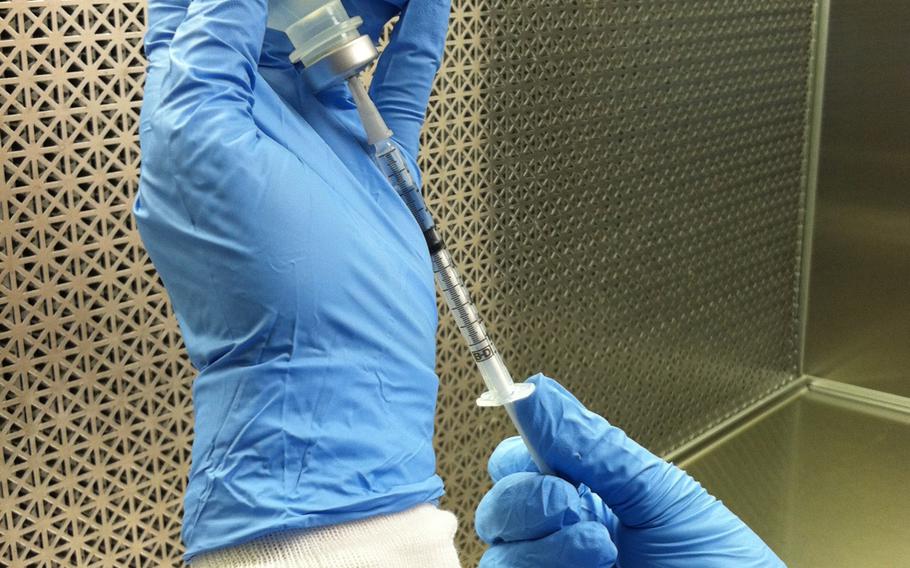Migration
Military research yields new tool in cancer fight
Stars and Stripes April 23, 2013

A lab worker mixes one of the five different cancer vaccines being developed and tested at Brooke Army Medical Center in San Antonio, Texas. Military researchers says they have developed a vaccine that appears to protect women against a recurrence of breast cancer. (Courtesy of Brooke Army Medical Center)
Military researchers have developed a vaccine that appears to protect women against a recurrence of breast cancer — a disease diagnosed in female troops at a rate 20 percent to 40 percent higher than in the civilian population.
The researchers recently completed a 10-year study of the vaccine, known as E75, which was tested on more than 100 female soldiers recovering from breast cancer along with a similar number of civilian women.
Army Col. George Peoples, who founded the Cancer Vaccine Development Program — an Army research network studying vaccines’ potential to fight breast, ovarian, uterine and prostate cancers — said the trial indicated the vaccine halves the risk that a woman’s breast cancer will return.
The Army has licensed the vaccine to pharmaceutical company Galena Biopharma, which is conducting a final set of trials with the goal of producing an approved drug within four years, he said.
Breast cancer research has been in the spotlight, thanks in part to promotional campaigns such as NFL players wearing pink on the field with the items then sold off to raise research funds, but there’s less awareness about the increased risk of the disease for military personnel.
A 2009 study by the U.S. Military Cancer Institute found rates among active female soldiers, who often work in toxic environments, were 20 percent to 40 percent higher than for the general population.
Peoples said that’s likely partly due to female soldiers being screened more regularly, but there’s plenty of impetus for the Army to develop more effective treatments for cancers that also impact male soldiers, dependents and retirees.
“Breast cancer is very prevalent within all these populations in the military community,” he said. “All these cancers are things we see on a day-to-day basis in our military health-care system.”
Vaccines can stop the spread of cancers in the same way that they fight infectious diseases — by training the body’s immune system to attack cancer cells, Peoples said.
Dr. Keith Knutson, a cancer immunologist at the Mayo Clinic in Rochester, Minn., said that vaccines have been approved to protect people from viruses that cause liver and cervical cancer, and that researchers are tackling other causes.
“We are in the stage now where we are looking at vaccines that prevent recurrence rather than preventing the diseases all together,” he said. “One day there could be vaccines that prevent breast or other cancers all together.”
The E75 vaccine targets a protein expressed in breast cancer cells.
“It is the same protein targeted by the (cancer) drug Herceptin,” Peoples said, adding that the protein is expressed in several other types of cancer cells, including prostate cancer.
Herceptin, however, is most effective in treating cancers with high levels of a certain protein, HER2, Peoples said. The new vaccine is able to treat all common cancers, such as breast, prostate, ovarian, colon and lung, he said.
E75 also is proving equally effective at protecting people against those diseases, he said.
The Army’s breast cancer vaccine trial was conducted at numerous military medical facilities, as well as 12 civilian facilities.
It involved vaccinating women, then following them over several years to gauge whether the vaccine could slow the recurrence rate, Peoples said.
All of the women in the trial were recovering from breast cancer surgery, chemotherapy or radiation therapy, so doctors knew the likelihoods the disease would return based on past research, he said.
“We found that the patients who were vaccinated had a recurrence rate that was half of non-vaccinated women,” Peoples said.
The Army researchers are also looking at using the immune system to attack another protein found in cancers called folate binding protein (FTB) and recently began a trial to see whether a vaccine can protect women from ovarian and uterine cancers, he said.
About 250 military personnel and 500 civilians are participating in the Army’s cancer vaccine trials, he said.
Raquel Gutierrez, 52, a Tricare beneficiary whose husband is an Air Force retiree, was diagnosed with breast cancer in January 2010. She had a lump removed and underwent chemo and radiation therapy for months.
She joined the Army vaccine study in October 2011 and had a series of vaccine injections at San Antonio Military Medical Center and Lackland Air Force Base that she hopes will keep the disease from returning.
“Having the vaccine has given me the feeling that I’ve got a better chance of recovery,” said Gutierrez, who’s been told that, if she’s still cancer-free after five years, the disease is unlikely to return.
Another study participant, Kellie Trombitas, served in the Army in 1976-79 and is preparing to follow her soldier husband to Mexico, where he will work as a military attaché.
The 54-year-old San Antonio resident said she was diagnosed in March 2011 and had a breast lump and lymph nodes removed from one side of her body as well as 10 months of chemo and radiation therapy.
Doctors have told her she has a 93 percent chance of survival but there’s a risk that the cancer could return, she said. Even if the vaccine doesn’t help her — and there’s a possibility that she’s getting a placebo in the study — she’s excited about its potential to benefit other women.
“I’ve had several friends who were treated for breast cancer and had it come back,” she said. “One is being treated for the third time. She has spots on her lungs… another friend has it in her bones.”